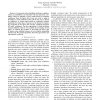Free Online Productivity Tools
i2Speak
i2Symbol
i2OCR
iTex2Img
iWeb2Print
iWeb2Shot
i2Type
iPdf2Split
iPdf2Merge
i2Bopomofo
i2Arabic
i2Style
i2Image
i2PDF
iLatex2Rtf
Sci2ools
208
click to vote
ICDE
2009
IEEE
2009
IEEE
Confidence-Aware Join Algorithms
In uncertain and probabilistic databases, confidence values (or probabilities) are associated with each data item. Confidence values are assigned to query results based on combining confidences from the input data. Users may wish to apply a threshold on result confidence values, ask for the "top-k" results by confidence, or obtain results sorted by confidence. Efficient algorithms for these types of queries can be devised by exploiting properties of the input data and the combining functions for result confidences. Previous algorithms for these problems assumed sufficient memory was available for processing. In this paper, we address the problem of processing all three types of queries when sufficient memory is not available, minimizing retrieval cost. We present algorithms, theoretical guarantees, and experimental evaluation.
Related Content
| Added | 20 Oct 2009 |
| Updated | 20 Oct 2009 |
| Type | Conference |
| Year | 2009 |
| Where | ICDE |
| Authors | Parag Agrawal, Jennifer Widom |
Comments (0)

